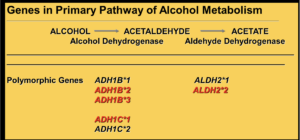
Much of Dr. Luczak’s research has been aimed at better understanding underlying mechanisms for the development of alcohol use and problems, particularly in university students.
This research has been funded primarily by NIAAA (e.g., K08AA014265, Luczak PI; R21AA017711, Luczak PI; R01AA018179, Luczak PI; R01AA011257, Wall PI; R21AA026654, Cook PI) as well as by NIDA (R01AA37217, Doran PI) in collaboration with Tamara Wall, Ph.D., Tiebing Liang, Ph.D., Neal Doran, Ph.D., and Won Kim Cook, Ph.D., among others.
-

As part of this work, Dr. Luczak has focused on gene-gene and gene-environment interactions, with particular emphasis on alcohol metabolizing genes that vary across individuals of Asian, Caucasian, Jewish, and African heritage. This research has shown that theinterplay between alcohol metabolizing genes and drinking-related problems is complex, involving both mediation and moderation processes that reduce the likelihood of developing problems via reduction of heavy drinking as well as by altering the relationship between alcohol consumption and problems. These findings also indicate a possible point to intervene in this pathway once drinking has occurred, for example based on response to alcohol and heavy consumption patterns.
-

In addition to genetic influences, Dr. Luczak seeks to understand the etiology of alcohol involvement via sociocultural risk and protective factors such as cultural, familial, religious, and ethnic group factors. She has examined these topics in a variety of ethnic and religiousgroups. This work has shown that religious variables such as service attendance and importance of religion operate differently across religious groups, that the construct of alcohol problems is not invariant across religious groups with different norms for drinking, and that the interaction of perceived group norms and individual-level religiosity is a key predictor of alcohol-related behaviors and problems. Continued work in this area seeks to examine a wide range of factors at the individual and environmental levels as explanatory variables for ethnic group differences in alcohol use and consequences as well as other addictive behaviors like gambling and nicotine use.
-
Luczak, S. E., Liang, T., & Wall, T. L. (2017). Age of drinking initiation as a risk factor for alcohol use disorder symptoms is moderated by ALDH2 and ethnicity. Alcoholism: Clinical and Experimental Research, 41, 1738-1744. https://www.ncbi.nlm.nih.gov/pmc/articles/PMC5626619/
Doran, N., Brikmanis, K., Petersen, A., Delucchi, K. J., Al-Delaimy, W. K., Luczak, S. E., Myers, M. G., & Strong, D. (2017). Does e-cigarette use predict cigarette escalation? A longitudinal study of young adult non-daily smokers. Preventive Medicine, 100, 279-284. https://www.ncbi.nlm.nih.gov/pmc/articles/PMC5481155/
Luczak, S. E., & Wall, T. L. (2016). Gambling problems and comorbidity with alcohol use disorders in Chinese-, Korean-, and White-American college students. The American Journal on Addictions, 25, 195-202. https://www.ncbi.nlm.nih.gov/pmc/articles/PMC5319422/
Luczak, S. E., Yarnell, L. M.*, Prescott, C. A., Myers, M. G., Liang, T., & Wall, T. L. (2014). Effects of ALDH2*2 on alcohol problem trajectories of Asian American college students. Journal of Abnormal Psychology, 123, 130-140. https://www.ncbi.nlm.nih.gov/pmc/articles/PMC4074595/
Luczak, S. E., Pandika, D.*, Shea, S. H., Eng, M. Y., Liang, T., & Wall, T. L. (2011). ALDH2 and ADH1B interactions in retrospective reports of low-dose reactions and initial sensitivity to alcohol in Asian-American college students. Alcoholism: Clinical and Experimental Research, 35, 1238-1245. https://www.ncbi.nlm.nih.gov/pmc/articles/PMC3116988/
Eng, M. Y.*, Luczak, S. E., & Wall, T. L. (2007). ALDH2, ADH1B, and ADH1C genotypes in Asians: A literature review. Alcohol Research and Health, 30, 22-27. https://www.ncbi.nlm.nih.gov/pmc/articles/PMC3860439/
Luczak, S. E., Glatt, S. J., & Wall, T. L. (2006). Meta-analyses of ALDH2 and ADH1B with alcohol dependence in Asians. Psychological Bulletin, 132, 607-621. https://pubmed.ncbi.nlm.nih.gov/16822169/
Luczak, S. E., Wall, T. L., Cook, T. A. R.*, Shea, S. H.*, & Carr. L. G. (2004). ALDH2 status and conduct disorder mediate the relationship between ethnicity and alcohol dependence in Chinese, Korean, and White American college students. Journal of Abnormal Psychology, 113, 271-278.
Luczak, S. E., Corbett, K.*, Oh, C.*, Carr, L. G., & Wall, T. L. (2003). Religious influences on heavy episodic drinking in Chinese-American and Korean-American college students. Journal of Studies on Alcohol, 64, 467-471. https://pubmed.ncbi.nlm.nih.gov/12921188/
Luczak, S. E., Shea, S. H.*, Carr. L. G., Li, T.-K., & Wall, T. L. (2002). Binge drinking in Jewish and non-Jewish white college students. Alcoholism: Clinical and Experimental Research, 12, 1773-1778.
Luczak, S. E., Elvine-Kreis, B. J., Shea, S. H.*, Carr, L. G., & Wall, T. L. (2002). Genetic risk for alcoholism relates to level of response to alcohol in Asian-American men and women. Journal of Studies on Alcohol, 63, 74-82. https://pubmed.ncbi.nlm.nih.gov/11925062/
Luczak, S. E., Wall, T. L., Shea, S. H.*, Byun, S.*, & Carr, L. G. (2001). Binge drinking in Chinese, Korean, and White college students: Genetic and ethnic group differences. Psychology of Addictive Behaviors, 15, 306-309. https://pubmed.ncbi.nlm.nih.gov/11767261/
Luczak, S. E., Raine, A., & Venables, P. A. (2001). Invariance of the MAST across religious groups. Journal of Studies on Alcohol, 62, 834-837.
Contact Details
Susan E. Luczak Ph.D.
Dornsife College of Letters, Arts, and Sciences
Department of Psychology
3620 McClintock Ave.
SGM 501
Los Angeles, CA 90089